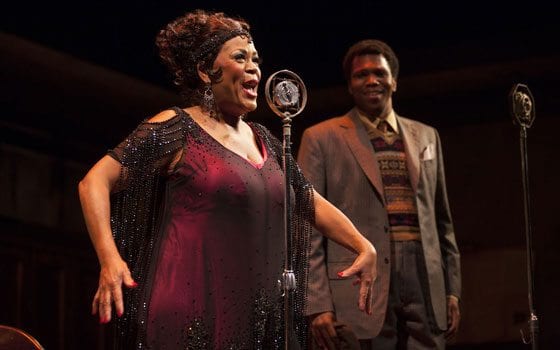
The August Wilson canon at Huntington Theatre Company is now complete, and what an achievement it is. Standout productions from the great dramatist’s ten play cycle have included richly lyrical editions of such masterworks as “The Piano Lesson” and “Joe Turner’s Come and Gone.”
Now the BU Theatre company has turned Wilson’s first work (1982; 1985 Tony Award) into another triumph. Quite simply, the Huntington “Ma Rainey’s Black Bottom” fires up this disturbing masterwork with a fiery spirit.
Set in Chicago (unlike the Pittsburgh-located other nine plays ) at a dilapidated music studio in the 1920’s, “Ma Rainey’s Black Bottom” introduces themes of racial and generational strife that were to dominate Wilson’s entire play cycle.
Rainey’s band are awaiting the arrival of the early blues diva in order to record new sides of popular numbers. As Clint Ramos’ sharply structured studio set demonstrates, white studio owner Sturdyvant looks down from above stage right on the musicians below stage left.
Bigoted Sturdyvant has the African American musicians — trumpeter Levee, pianist Toledo, trombonist Cutler and bassist Slow Drag — rehearse and eat in their stage left room and remain there as they wait. Irvin, Rainey’s white manager, plays obsequious mediator between Sturdyvant and late-arriving Ma. Throughout the disagreements between Sturdyvant and Ma Rainey, Irvin moves up and down a stage right ladder connecting with Sturdyvant’s studio.
Director Liesl Tommy smoothly orchestrates Irvin’s moves as well as Sturdyvant’s occasional downstairs visits to try to get his way with Rainey and her music.
For newcomers to Wilson’s brilliant first play, Tommy’s smart blocking — both before Ma’s late first act arrival and throughout the recordings and disagreements about them thereafter — makes it very clear that her sharply phrased blues is a very rich metaphor for black life.
Rainey may be a fussy diva, but no more so than contemporary performers like Beyonce and Rihanna. Besides, her pioneering efforts were truly authentic. It is that authenticity in signature hits like “Moonshine Blues” that fascinated Wilson. Sturdyvant represents exploiting studio owners intent on manipulating singular black talents and maintaining a racist take on African American dreams.
Trumpeter Levee is an ambitious young trumpeter with dreams of starting his own band and playing the original songs he is composing. Will he reign in his dreams and his desire to improvise and explore or set out on his own?
Will he take advice from the veteran musicians accompanying Rainey, especially paternal Toledo? Will he sell his songs to Sturdyvant for a pittance? Will he take his cues from Ma Rainey? Wilson eventually answers all of these questions in an explosive, even startling but powerfully disturbing conclusion. The music world and America have come a long way since the racism and exploitation of the 1920’s. Still, Wilson’s play resonates forcefully today as more subtle discriminations continue.
Tommy’s first-rate cast orchestrate the play’s messages with both individual and ensemble power. Yvette Freeman, decked out in costume designer Ramos’ flashy and dressy outfits, beautifully balances Rainey’s admirable stubbornness about her recordings, her caring for a stuttering nephew, her involvement with a young black flapper and her vulnerability as a determined woman and singer.
Jason Bowen gives an electrifying performing as cocky, dream-rich Levee. His heart-wrenching revelation of the trumpeter’s painful childhood is haunting and chilling. The other standout stretches involve the seemingly unimportant exchanges between the musicians when they are not rehearsing, moments in which Wilson reveals their respective disappointments and radiant humanity.
Charles Weldon brings winning understatement to bookish sage Toledo and proper fire to his confrontations with Levee. G. Valmont Thomas has the right discipline as unswerving bandleader Cutler, and Glenn Turner has the right easy charm and humor as Slow Drag. Thomas Derrah captures Sturdyvant’s greedy opportunism, and Will LeBow catches Irvin’s nervousness as he tries to please Rainey and Sturdyvant.
A black bottom was a fast-paced rhythmic dance and an authentic part of early 20th century African American life. August Wilson captured the heart and soul of the black experience from decade to decade in his amazing ten-play cycle. “Ma Rainey’s Black Bottom” — especially in Huntington Theatre’s definitive staging — is a brilliant part of that singular achievement.




![Banner [Virtual] Art Gallery](https://baystatebanner.com/wp-content/uploads/2024/04/NJ-H_1-713x848.jpg)

